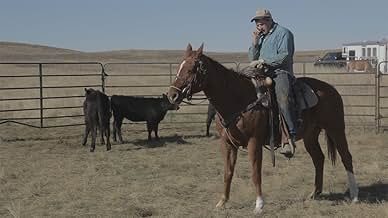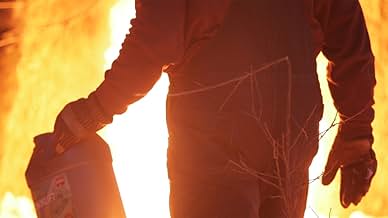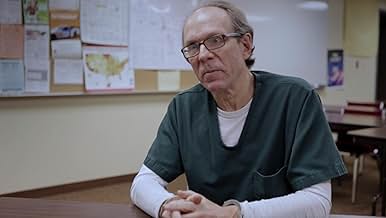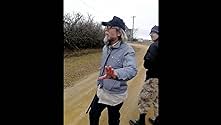IMDb RATING
6.9/10
4.6K
YOUR RATING
When a noted white supremacist moves into their town, the residents of Leith, North Dakota do what they can to prevent him from taking control of the municipality.When a noted white supremacist moves into their town, the residents of Leith, North Dakota do what they can to prevent him from taking control of the municipality.When a noted white supremacist moves into their town, the residents of Leith, North Dakota do what they can to prevent him from taking control of the municipality.
- Directors
- Writers
- Stars
- Awards
- 8 wins & 31 nominations total
- Directors
- Writers
- All cast & crew
- Production, box office & more at IMDbPro
Featured reviews
The people that made "Welcome to Leith" did a nice job of presenting a reasonably well balanced and interesting story. While they obviously didn't like the white supremacists featured in the film, they also were sure to present the complete story...warts and all.
The town of Leith is extremely tiny and located in the Dakotas. When a crazed white supremacist arrives there and starts buying up property, folks start getting concerned. When he then starts inviting in other like-minded jerks, the town starts to react...strongly. What follows is a film that consists of showing the tiny town's efforts to get rid of the supremacists and prevent them from taking over Leith. Unfortunately, when the neo-Nazis actually do something that might be illegal, some of the townsfolks manage to undo the state's case by talking out of turn...and some of these people later blame the state for the case falling apart. However, the way I saw the film I don't believe the authorities LEGALLY had much more they could do about the supremacists...and the film leaves everything in limbo. This could REALLY benefit from a follow-up to know what subsequently occurred.
As I mentioned, the people who made the film were great--they were very thorough and did a wonderful job in presenting both sides. It's not 100% satisfying to watch, however, for two reasons. First, in real life things often DON'T work out perfectly...as the film illustrates. And, Second, despite 99.9% of the viewers wanting to see these neo-Nazis die or go to prison forever, legally this wasn't possible due to Constitutionally guaranteed rights...even the right to be an evil, nasty, hateful individual! To me this isn't a bad thing...everyone deserves protection--whether or not they are nice people...though I am sure many will be angered by this. Despite its shortcomings, it does make for an interesting documentary as well as a great civics lesson.
The town of Leith is extremely tiny and located in the Dakotas. When a crazed white supremacist arrives there and starts buying up property, folks start getting concerned. When he then starts inviting in other like-minded jerks, the town starts to react...strongly. What follows is a film that consists of showing the tiny town's efforts to get rid of the supremacists and prevent them from taking over Leith. Unfortunately, when the neo-Nazis actually do something that might be illegal, some of the townsfolks manage to undo the state's case by talking out of turn...and some of these people later blame the state for the case falling apart. However, the way I saw the film I don't believe the authorities LEGALLY had much more they could do about the supremacists...and the film leaves everything in limbo. This could REALLY benefit from a follow-up to know what subsequently occurred.
As I mentioned, the people who made the film were great--they were very thorough and did a wonderful job in presenting both sides. It's not 100% satisfying to watch, however, for two reasons. First, in real life things often DON'T work out perfectly...as the film illustrates. And, Second, despite 99.9% of the viewers wanting to see these neo-Nazis die or go to prison forever, legally this wasn't possible due to Constitutionally guaranteed rights...even the right to be an evil, nasty, hateful individual! To me this isn't a bad thing...everyone deserves protection--whether or not they are nice people...though I am sure many will be angered by this. Despite its shortcomings, it does make for an interesting documentary as well as a great civics lesson.
This reminded me of Wild Wild Country where a band of renegades takes over a small town for their own nefarious purposes. Both end almost the same way. But Leith was only 2hrs vs WWC at 6 or 7.
It is a sad state when we can't or won't remember and learn from our own history. This movie does a pretty good job showcasing white supremists and their tactics and the struggle a little known town had to endure because these nuts were trying to prove something.
Well told and fast paced. Would totally recommend.
It is a sad state when we can't or won't remember and learn from our own history. This movie does a pretty good job showcasing white supremists and their tactics and the struggle a little known town had to endure because these nuts were trying to prove something.
Well told and fast paced. Would totally recommend.
I wish that this wasn't a documentary.
The movie overall is extremely gripping and entertaining and well-put together. The content is horrible, and I wish that the events shown in it had never happened. This has little to do with my enjoyment of the film, however. The movie was well-put together and I liked seeing all the perspectives. It seemed like the filmmakers were trying to get the audience to sympathize with the nazis, but other than that I enjoyed this movie.
The movie overall is extremely gripping and entertaining and well-put together. The content is horrible, and I wish that the events shown in it had never happened. This has little to do with my enjoyment of the film, however. The movie was well-put together and I liked seeing all the perspectives. It seemed like the filmmakers were trying to get the audience to sympathize with the nazis, but other than that I enjoyed this movie.
Leith, a registered ghost town in North Dakota, is home to twenty people and a single shop. The almost entirely forgotten town suddenly becomes the most discussed settlement in America as renowned white supremacist Craig Cobb moves in to buy up land and property to rent out or give away to the country's most notorious Nazi groups. Cobb's grand plan is to become mayor of the town and create America's first legal white-only town. This startling documentary details the events of the subsequent months.
With its isolated small town backdrop and bleached, low-contrast colourisation of the stock, Welcome to Leith gives the impression of a fictional horror movie. During the winter months, you could be watching Fargo. As the feeling of threat and dread hover over the dinner table during the resident's mealtimes, it appears to come straight from a M Night Shyamalan nightmare.
Cobb's appearance is part aging thrash metal guitarist, part Peter Stringfellow with jovial smiles that betray the viciousness below the surface. Dutton is an Iraq war veteran with possibly the worst Hitler moustache in history who seems to gain more sympathy from the audience than loathing. It feels that Dutton, although harbouring abhorrent beliefs, is principally concentrating on receiving approval from Cobb, who takes on an adopted father figure role. It's Dutton's girlfriend Deborah Henderson who is the truly chilling one, with a vicious uncompromising hatred for non-whites and a predatory growl constantly smeared across her face.
What Nichols and Walker do exceptionally shrewdly is to give both corners of the ring the time to discuss their particular point of view. What this effectively does is give access to all of the players, something rarely achieved in a documentary about extremism, and this produces a wonderful insight into evil-doer's everyday life. Seconds after seeing Dutton performing aggressive sieg heils at a town meeting in the face of Leith's only black resident, Bobby Harper, we see him making banana fritters in his kitchen discussing his dreams of becoming a celebrity chef. The writers realise that given enough rope, the white supremacists will happily hang themselves anyway; the exasperated cries from the Cheyenne plains are clearly audible as Dutton argues that white births are now in the minority for the first time in American history. Cobb takes a DNA test on national television to prove his racial purity, only to find out he's fourteen percent African.
This even handedness rightfully reaps rewards towards the end of the film as they manage to obtain video footage from Deborah Henderson's smartphone. This shows Cobb and Dutton marching through the town with loaded rifles shouting racial slurs at the residents. It is at this moment, with whispered comments such as 'Make sure they shoot first', the realisation sinks in that for all the talk and arrogant discrimination, there is a true threat of lethal violence involved here.
Another attractive observation is the charming naivety the original residents have to extremism. Mayor Schock freely admits to not even knowing what a white supremacist was before meeting Cobb. It is refreshing then to observe how a community can pull together to defend one another's rights, and you get a stimulating insight into the way America works at ground level as the council try to work around the first amendment excuses Cobb obsesses on so well. When does one's right to freedom of speech become another's illegal hate- crime discrimination? The town's council at one point pass a new law requiring every living accommodation to have plumbed sewage, in one clean sweep making the majority of Cobb's rental properties, housing the white supremacists, illegal. This is a fascinating move to counteract Cobb's completely, and astonishingly, legal Nazi hate- speech and threats of gun violence.
Welcome to Leith is a terrifying yet fascinating account of a dark recess of American society and culture. It is made with clarity and observed impartiality and stands out impressively against previous documentaries of a similar ilk.
With its isolated small town backdrop and bleached, low-contrast colourisation of the stock, Welcome to Leith gives the impression of a fictional horror movie. During the winter months, you could be watching Fargo. As the feeling of threat and dread hover over the dinner table during the resident's mealtimes, it appears to come straight from a M Night Shyamalan nightmare.
Cobb's appearance is part aging thrash metal guitarist, part Peter Stringfellow with jovial smiles that betray the viciousness below the surface. Dutton is an Iraq war veteran with possibly the worst Hitler moustache in history who seems to gain more sympathy from the audience than loathing. It feels that Dutton, although harbouring abhorrent beliefs, is principally concentrating on receiving approval from Cobb, who takes on an adopted father figure role. It's Dutton's girlfriend Deborah Henderson who is the truly chilling one, with a vicious uncompromising hatred for non-whites and a predatory growl constantly smeared across her face.
What Nichols and Walker do exceptionally shrewdly is to give both corners of the ring the time to discuss their particular point of view. What this effectively does is give access to all of the players, something rarely achieved in a documentary about extremism, and this produces a wonderful insight into evil-doer's everyday life. Seconds after seeing Dutton performing aggressive sieg heils at a town meeting in the face of Leith's only black resident, Bobby Harper, we see him making banana fritters in his kitchen discussing his dreams of becoming a celebrity chef. The writers realise that given enough rope, the white supremacists will happily hang themselves anyway; the exasperated cries from the Cheyenne plains are clearly audible as Dutton argues that white births are now in the minority for the first time in American history. Cobb takes a DNA test on national television to prove his racial purity, only to find out he's fourteen percent African.
This even handedness rightfully reaps rewards towards the end of the film as they manage to obtain video footage from Deborah Henderson's smartphone. This shows Cobb and Dutton marching through the town with loaded rifles shouting racial slurs at the residents. It is at this moment, with whispered comments such as 'Make sure they shoot first', the realisation sinks in that for all the talk and arrogant discrimination, there is a true threat of lethal violence involved here.
Another attractive observation is the charming naivety the original residents have to extremism. Mayor Schock freely admits to not even knowing what a white supremacist was before meeting Cobb. It is refreshing then to observe how a community can pull together to defend one another's rights, and you get a stimulating insight into the way America works at ground level as the council try to work around the first amendment excuses Cobb obsesses on so well. When does one's right to freedom of speech become another's illegal hate- crime discrimination? The town's council at one point pass a new law requiring every living accommodation to have plumbed sewage, in one clean sweep making the majority of Cobb's rental properties, housing the white supremacists, illegal. This is a fascinating move to counteract Cobb's completely, and astonishingly, legal Nazi hate- speech and threats of gun violence.
Welcome to Leith is a terrifying yet fascinating account of a dark recess of American society and culture. It is made with clarity and observed impartiality and stands out impressively against previous documentaries of a similar ilk.
Welcome to Leith was well-received at its showing at Austin's SXSW Film Festival. The film documents the peculiar events that occurred in 2013-2014 when a nationally-known white supremacist Craig Cobb moves to tiny Leith, North Dakota (population: 24) with a plan to buy up land and take over city government and make it into some sort of center of white supremacy. Once alerted by the Southern Poverty Law Center (SPLC) the ordinary town folks mobilize to fight back and save their town from Cobb's nefarious plan.
The odd part of the story is that Cobb's plan seems to be legal. (When he and his partner are finally arrested they almost seem to have been provoked.) There is nothing illegal about buying land and moving into a town. And the first amendment allows him to express his beliefs and fly his Nazi flags no matter how evil and offensive those beliefs may be. The town residents actually seemed to be making excuses to get rid of him such as citing him for not having running water and a sewage system on his property.
Fundamentally, the film asks the question is democracy about the community making decisions by the will of the majority or is there a basic set of minimum beliefs about human equality that are necessary prerequisites to participate in democratic society? The majority of the town seemed to decide – really quite reasonably - that Cobb's noxious beliefs were so anti-egalitarian that they didn't want him and his cronies to live in their town. They are in some sense intolerant of his intolerant beliefs, but one can hardly blame them.
Welcome to Leith is beautifully filmed and the filmmakers maintain an impressive level of objectivity about their offensive subject. They let his evil beliefs discredit themselves rather than trying to paint Cobb as anything more than the pathetic nasty creature that he is. The townspeople come off as genuine and human. Perhaps it is a positive sign that this sort of racism is unacceptable even in one of the smallest most isolated corners of the United States. I hope that Welcome to Leith gets widely distributed so that many more people can enjoy this powerful film.
The odd part of the story is that Cobb's plan seems to be legal. (When he and his partner are finally arrested they almost seem to have been provoked.) There is nothing illegal about buying land and moving into a town. And the first amendment allows him to express his beliefs and fly his Nazi flags no matter how evil and offensive those beliefs may be. The town residents actually seemed to be making excuses to get rid of him such as citing him for not having running water and a sewage system on his property.
Fundamentally, the film asks the question is democracy about the community making decisions by the will of the majority or is there a basic set of minimum beliefs about human equality that are necessary prerequisites to participate in democratic society? The majority of the town seemed to decide – really quite reasonably - that Cobb's noxious beliefs were so anti-egalitarian that they didn't want him and his cronies to live in their town. They are in some sense intolerant of his intolerant beliefs, but one can hardly blame them.
Welcome to Leith is beautifully filmed and the filmmakers maintain an impressive level of objectivity about their offensive subject. They let his evil beliefs discredit themselves rather than trying to paint Cobb as anything more than the pathetic nasty creature that he is. The townspeople come off as genuine and human. Perhaps it is a positive sign that this sort of racism is unacceptable even in one of the smallest most isolated corners of the United States. I hope that Welcome to Leith gets widely distributed so that many more people can enjoy this powerful film.
Did you know
- ConnectionsEdited into Op-Docs: Separatist (2015)
- How long is Welcome to Leith?Powered by Alexa
Details
Box office
- Gross US & Canada
- $36,010
- Opening weekend US & Canada
- $3,707
- Sep 13, 2015
- Gross worldwide
- $36,380
- Runtime1 hour 25 minutes
- Color
Contribute to this page
Suggest an edit or add missing content






































